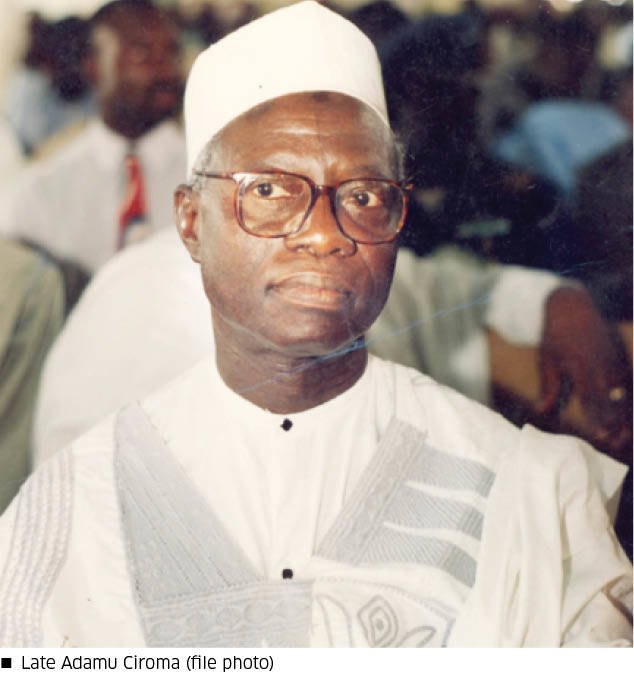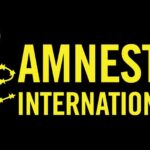
For nearly two decades before I ever set my eyes on him, Malam Adamu Ciroma, Madakin Fika, was already a very well-known personality on the Northern and national media, public service, business and political landscapes. I started reading New Nigerian newspaper during my early primary school years in the late 1960s and his name, which was printed at the bottom of the back page as the editor, was soon very familiar to me.
Adamu Ciroma was the first editor of New Nigerian from the day the Premier Sir Ahmadu Bello launched it in 1966 until around 1969 when he took over the managing directorship from its pioneer MD Mr. Charles Sharp, a Briton. He handed over the editorship to Malam Mamman Daura, whose name I also became very familiar with. Before he was sent to edit New Nigerian, Adamu Ciroma was an Assistant Secretary in the Premier’s Office, one of the North’s best and brightest, a graduate of the University of Ibadan, one of the able young men that contributed to the great Premier’s reputation for vision, dynamism and efficiency.
In 1974, New Nigerian announced Ciroma’s departure as its MD and Mamman Daura again succeeded him. As the late Malam Turi Muhammadu recounted in his book, those were the years when New Nigerian was at its greatest, most powerful and most courageous phase. In 1995 Adamu Ciroma told me a memorable story from those years. He said at the start of the Nigerian civil war in 1967 a Biafran B-26 bomber bombed the old Kaduna airport. He said the plane flew over Kaduna for an hour, apparently searching for the airport and all city residents dived into gutters as Civil Defence told them to do. The plane finally dropped an improvised barrel of petrol ringed by grenades, which created a deep crater on the airport runway.
That night, New Nigerian’s editor received a phone call from the Military Governor of Northern Nigeria, Major Hassan Usman Katsina. The governor demanded that the story of the bombing should not be published “in order not to assist Ojukwu’s rebel propaganda.” Ciroma however said, “Everyone in Kaduna saw that plane. If people wake up tomorrow and the story is not in the paper, what happens to our credibility? No one will ever believe what we say again.” So the story was published and the governor was very angry. As a direct result of that attack, the Federal Military Government of General Yakubu Gowon acquired MiG-17 warplanes from the Soviet Union, together with mercenary Egyptian pilots and began bombing Biafran towns.
Biafra lodged a complaint with OAU and the Federal Commissioner for External Affairs Dr. Okoi Arikpo struggled to answer. He accused Biafra of starting the bombing campaign and the only evidence he had was a copy of New Nigerian which reported the attack. When Major Hassan Katsina heard of this episode, he called Ciroma and apologized for trying to stop the story. I related this story some years ago when I delivered papers to military officers first at the Command and Staff College, Jaji and later at the National Defence College. A month after I spoke at Jaji, some officers came to my office in Kaduna and said their bosses in the Air Force disputed the story of the bombing. We therefore walked over to New Nigerian’s library [I was its editor then] and fished out the lead story from July, 1967.
I also knew when the Murtala regime appointed Adamu Ciroma as Governor of Central Bank of Nigeria [CBN] in 1975. The announcement was made at the same time as that of Aliko Mohammed, Dan Iyan Misau as chairman of the board of Daily Times. Stories later made the rounds that Chief of Staff, Supreme Headquarters Brigadier Olusegun Obasanjo mistakenly mixed up the two appointments. It sounded sensible at the time because Aliko Mohammed is a chartered accountant and business whiz kid whereas Ciroma was best known as a civil servant and newspaper boss. I only got to raise this matter with Adamu Ciroma in 2013 and he firmly said it was not a mistake, that he had already been a board member of CBN for many years before he was made the governor.
Two years later, Adamu Ciroma shockingly resigned as CBN governor in order to contest for a place in the 1977-78 Constituent Assembly, which ratified the 1979 Constitution. I again raised this matter with Ciroma in 2013 and he said a delegation from his home town, Fika Emirate in old Borno [now Yobe] State went to him and asked him to represent them at the CA. Well, I thought, Fika certainly put its best foot forward at the CA but it is still a wonder that any Nigerian community will ask its son to quit the CBN governor’s job. Given what happened subsequently, I think it is possible that Malam Adamu had already set his sights on contesting for the presidency in 1979.
Anyway, he became a founding member of the National Party of Nigeria, NPN in 1978 and was one of the six men that contested for its presidential ticket. NPN had zoned its presidential ticket to the North. Alhaji Shehu Shagari came first in the contest; Alhaji Yusuf Maitama Sule came second and Adamu Ciroma was third. The other contestants were Dr. Olusola Saraki, Chief Joseph Tarka and Prof Iya Abubakar. A run-off election was scheduled between the first three but as we saw in the NTA Network News that night, Maitama Sule and Ciroma conceded to Shagari and the run off was avoided. Days later Ciroma was appointed National Secretary of NPN, a post he held until 1979 when he became a Minister in Shagari’s cabinet.
Despite that long knowledge of him as a public figure, I saw Malam Adamu Ciroma for the first time in January 1991 at the home of Ambassador Muhammadu Carpenter in Kaduna, at the naming ceremony of the ambassador’s grandson. Even then he looked frail and walked with a stick. Ciroma and other “old breed” politicians were then banned from politics but he was working behind the scenes in support Marafan Sokoto Alhaji Umaru Shinkafi’s presidential ambition. Both of them belonged to NPN’s “integrity faction.” General Babangida however created a big problem in January 1992 when he suddenly unbanned the old breed politicians. Ciroma quickly entered the race for the NRC presidential ticket [as did Major General Shehu Yar’adua, Alhaji Bamanga Tukur and many others]. By then I was privately advising Shinkafi and I knew intimately the problem it caused. Ciroma, who is one of the most articulate men [if not the most articulate] I have ever seen in Nigerian politics and public service, had a hard time explaining in media interviews why he joined the race.
I was there at Damaturu when Ciroma formally launched his presidential campaign in February or March 1992. Even though he was by then the most important Northern politician after Yar’adua, Ciroma always had a problem at home. He was in NPN when GNPP ruled Borno and Yobe States and he was in NRC when SDP ruled both states. A week after the launch, I attended a press conference he held in Abuja. He was at his rhetorical best. When a reporter asked him if he was not afraid that he could be rigged out, Ciroma memorably said, “Election rigging is a self- fulfilling prophecy. Because you think your opponent is going to rig you out, you take steps to prevent him from rigging you out and you end up rigging him out.” He was among the 23 top politicians that IBB again banned in late 1992, paving the way for Option A4 primaries and June 12.
In 1996 when I began writing weekly columns in New Nigerian, I wrote one that Malam Adamu Ciroma so liked that he sent me a written message of thanks. The Abacha regime wanted to ban old breed politicians again and I wrote that voters should not be expected to vote for a person whose record they don’t know, without recommendation from the old breed anymore than school authorities and employers of labour ask for reference letters from young people. After that note, I became a regular visitor at his home in Kaduna. He told me [I hope this is not immodesty] that I was the best writer in New Nigerian since Mamman Daura. It was during the Abacha days and once he discovered that I was also very critical of Abacha privately, he relaxed and we discussed freely. At one point he told me that he knew I was a Shinkafi man. When I arrived at his house one night he said, “Marafa naka [your man Marafa] just left here.” He repeated it again, so it will sink in.
A few days after Abacha died, I went to Malam Adamu’s house and what happened did not please me at all. I began by condoling with him on Abacha’s death. This was just courtesy, but he said, “Those of you who supported Abacha [New Nigerian], he is gone now.” It was strange because we used to sit down and condemn Abacha together. That encounter strained our relationship, although I visited him a few times in his Abuja home and we even had a major interview in 2013.
Malam Adamu Ciroma’s keen intellect, his elegant speech, his deliberate and beautiful choice of words, his very rich media, public service and political experience and his wisdom, deep insight and very wide knowledge, plus his devotion to religious practice and community issues, was a mixture such as I have not seen in many other people in Nigerian public life. May Allah reward him with eternal rest in Aljannat.

 Join Daily Trust WhatsApp Community For Quick Access To News and Happenings Around You.
Join Daily Trust WhatsApp Community For Quick Access To News and Happenings Around You.


